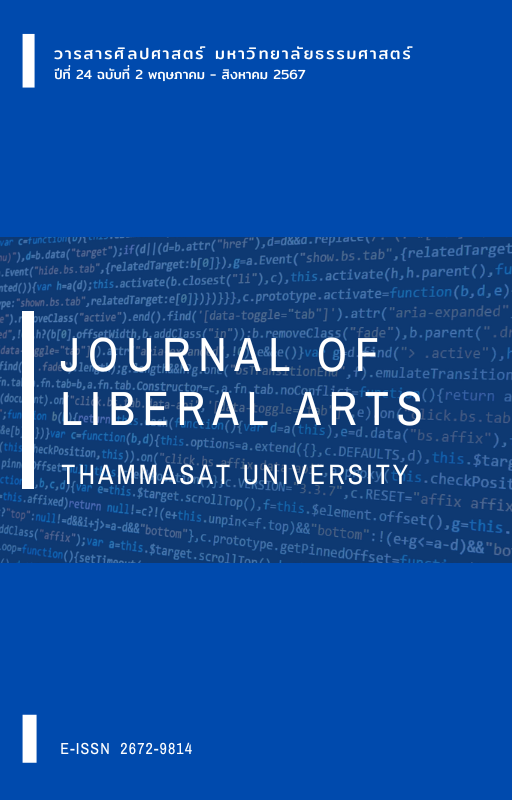Thai Learners’ Interpretation of English Modality
Main Article Content
บทคัดย่อ
This research aimed to examine the frequency and percentage of Thai undergraduate-level learners’ accurate interpretation of the modality meanings and time references denoted by nine core modal verbs of English: can, could, will, would, shall, should, may, might, and must. Each of these auxiliaries serves not only semantic (e.g., ability, possibility, permission of “can”) but also pragmatic functions (e.g., request of “can”). Some of them are “basic or unmarked,” and others are “extended or marked” (e.g., formality, politeness). Meanwhile, Thai preverbal modals convey a subset of these modality meanings, so complication may occur during the English-as-a-Foreign-Language (EFL) modal learning. Fifty multiple-choice questions with four choices representing the basic and extended modality meanings and time references were designed for the Thai participants to answer. It was found that the informants interpreted “can” the most successfully and “shall” the least successfully. Moreover, for each modal verb, some meanings were achieved more frequently than the others such as the meaning of “ability” of “can” over “possibility.” These findings were in line with the previous ones. With respect to time references, the Thai learners tended to associate tense with the modal forms, and the perfective forms of the verbal complements of the modal verbs caused interpretation challenges. The concepts “marked” and “unmarked” features under Markedness Theory were proposed to account for the EFL modality acquisition. The unmarked meanings were primarily acquired more successfully or earlier than the more marked ones, regardless of the first languages of the EFL learners.
Downloads
Article Details

อนุญาตภายใต้เงื่อนไข Creative Commons Attribution-NonCommercial-NoDerivatives 4.0 International License.
เอกสารอ้างอิง
Azar, B. S., & Hagen, S. A. (2009). Understanding and using English grammar (4th ed.). Pearson Education.
Cambridge University Press & Assessment. (n.d.). Modal verbs and modality. In Cambridge Dictionary Grammar. Retrieved April 1, 2023, from https://dictionary.cambridge.org/grammar/british-grammar/modal-verbs-and-modality
Jiang, Z., & Shao, C. (2006). Markedness in universal grammar and second language acquisition. US-China Education Review, 3(8), 77-79. https://files.eric.ed.gov/fulltext/ED497374.pdf
Li, L. X. (2022). Developmental patterns of English modal verbs in the writings of Chinese learners of English: A corpus-based approach. Cogent Education, 9(1), 1-23. https://doi.org/10.1080/2331186X.2022.2050457
Maurer, J. (2016). Focus on grammar 5: An integrated skills approach (5th ed.). Pearson Education.
Sakkanayok, K. (2016). L1 transfer as a source of difficulty for L2 learners: A comparative study of English and Thai verbal modality. Walailak Journal of Asian Studies, 1(1), 49-65.
Smyth, D. (2002). Thai: An essential grammar. Routledge.
Tangpijaikul, M. (2008). Thai EFL learners’ repertoire of English modality in academic and electronic bulletin board writing. rEFLections, 11, 19-27. https://doi.org/10.61508/refl.v11i0.114255
Torabiardakani, N., Khojasteh, L., & Shokrpour, N. (2015). Modal auxiliaries and their semantic functions used by advanced EFL learners. Acta Didactica Napocensia, 8(2), 51-61. https://files.eric.ed.gov/fulltext/EJ1073275.pdf
Vince, M. (2008). Macmillan English grammar in context: Intermediate. Macmillan Education.
Yangklang, P. (n.d.). L1 Thai-speakers' distinction of deontic and epistemic modality in English [Unpublished manuscript]. Silpakorn University.
Yangklang, P. (2011). Notes on reference time of epistemic modals and their verbal complements in English and Thai. Journal of Language and Culture, 30(2), 23-43. https://so03.tci-thaijo.org/index.php/JLC/article/view/20267
Yangklang, P. (2012). L2 acquisition of epistemic modality in English by L1 Thai-speaking children and adults [Doctoral dissertation, University of Leeds]. White Rose eTheses Online. https://etheses.whiterose.ac.uk/12748/1/582103.pdf
Yangklang, P. (2018). The L2 acquisition of the syntactic patterns that constrain the reference time of the epistemic modal complements. Vacana Journal, 6(1), 36-59. http://rs.mfu.ac.th/ojs/index.php/vacana/article/view/169/109
Zhang, Y., & Tian, F. (2015). Study on markedness in linguistics. Sino-US English Teaching, 12(9), 667-671. https://doi.org/10.17265/1539-8072/2015.09.004


